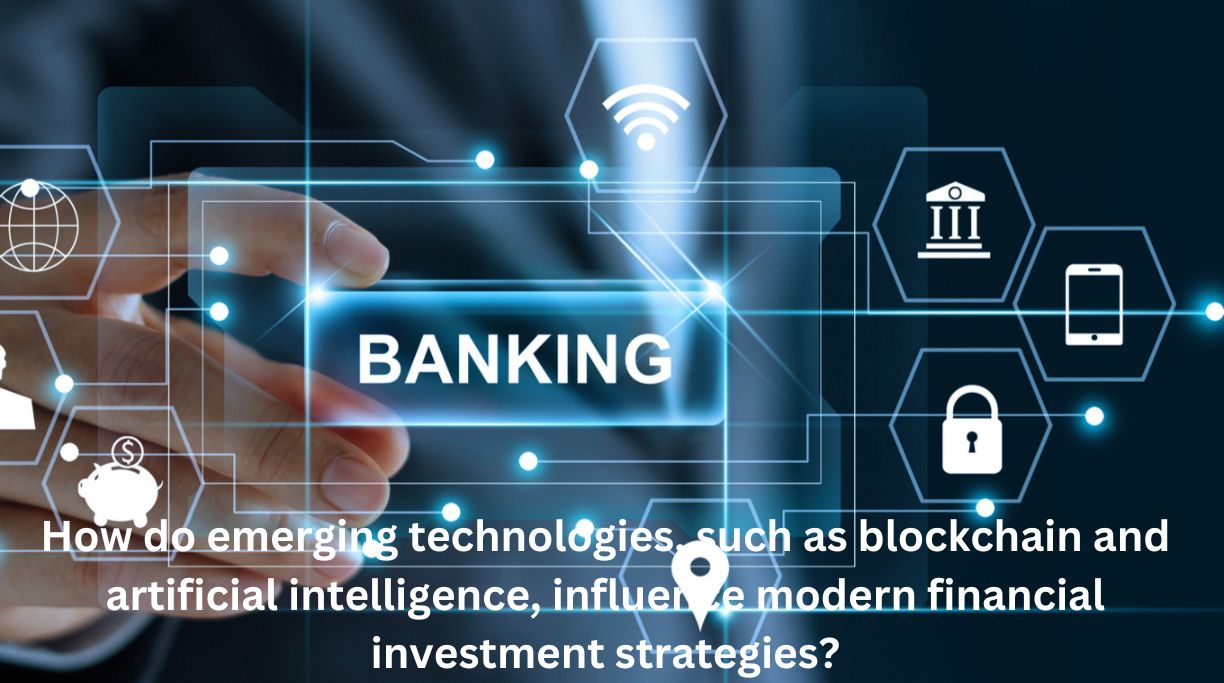Emerging technologies like blockchain and artificial intelligence (AI) are becoming game-changing forces in the fast-paced world of modern finance. For both individual traders and institutional investors, it is vital to comprehend their influence on financial investing techniques.
What Is Blockchain in Financial Investments?
Decentralized Security and Nature
The decentralized nature of blockchain lies at the heart of its impact on financial investments. Blockchain runs on a distributed ledger that is dispersed among a network of computers, in contrast to traditional financial systems where transactions are supervised by a central authority. The lack of middlemen brought about by this decentralization lowers the possibility of fraud and manipulation. The noteworthy element of blockchain is its security. By using cryptographic techniques to secure each transaction, an immutable chain of blocks is created. Changing earlier transactions is very difficult after a block is added to the chain. In addition to protecting financial data, this built-in security element increases user trust.
Automated Systems and Smart Contracts
Another aspect of blockchain technology that is revolutionizing financial investing is smart contracts, which are self-executing contracts with the terms of the agreement explicitly inscribed into the code. Without the need for middlemen, these contracts automate and enforce the fulfillment of predetermined conditions. Smart contracts simplify financial investment operations such as asset transfers and trade settlements. Their automation cuts down on the amount of time needed for these transactions and lowers the chance of mistakes. This efficiency lowers intermediary expenses while also improving the pace at which financial procedures are carried out.
Effects on Trust and Transparency
A strong financial system is built on trust and transparency. These qualities are further enhanced by the transparent and auditable ledger of blockchain technology. Every transaction is documented on the blockchain, and all parties have instant access to the data. In addition to lowering the possibility of fraudulent activity, this transparency fosters investor confidence. They are able to independently confirm transaction details, protecting the integrity of the financial system. Blockchain’s transparency acts as a catalyst to promote confidence in financial investments in a time when trust is crucial.
Read Also:
- How do emerging technologies, such as blockchain and artificial intelligence, influence modern financial investment strategies?
- In the realm of finance, what are the key considerations for diversifying investment portfolios to manage risk effectively?
- For individuals approaching retirement, what tailored investment strategies are recommended to secure financial stability during the post-working years?
- What impact do global economic trends have on formulating effective finance and investment strategies?
- How can beginners in finance develop a solid understanding of investment strategies to maximize their returns?
What Is Artificial Intelligence in Financial Investments?
Automated Learning Systems
Financial institutions are empowered by machine learning, a subset of artificial intelligence, to analyze large datasets and derive valuable insights. Machine learning algorithms are essential to the decision-making process when it comes to financial investing. By using past data, these algorithms are able to recognize patterns and trends that conventional analysis could miss. Machine learning algorithms can evaluate market circumstances, examine trade trends, and even forecast future changes in asset values in investing scenarios. The utilization of data-driven strategies improves the overall efficacy of financial strategies by empowering investors to make well-informed decisions grounded in real-time analysis.
Forecasting and Analysis
By predicting future patterns and behaviors, AI-powered predictive analytics advances machine learning. Predictive analytics models are used in financial investments to forecast future market movements by utilizing both historical data and present market conditions. Using these forecasts, investors can strategically allocate their assets in their portfolios according to anticipated changes in the market. Anticipating future market patterns enables investors to take proactive measures to optimize profits and mitigate risks. The dynamic and frequently surprising nature of the financial markets makes predictive analytics a useful tool.
Fraud detection and risk management
Beyond just forecasting market trends, artificial intelligence (AI) plays a critical role in financial investments by improving fraud detection and risk management. Large-scale datasets can be analyzed by machine learning algorithms to find possible dangers related to particular investments. AI models are used in risk management to evaluate variables including market volatility, economic indicators, and geopolitical events in order to generate a thorough risk profile. This helps investors make choices that are consistent with their overall investing plan and risk tolerance. Moreover, anomaly detection and pattern recognition are used by AI-driven fraud detection systems to spot anomalies in financial transactions. These tools help create a more safe and reliable financial environment by quickly identifying potentially fraudulent activity.
What Is Integration of Blockchain and Artificial Intelligence?
Combinations and Improvements
Blockchain and AI integration produces synergies that enhance the benefits of both technologies. The decentralized and secure characteristics of blockchain technology combine well with AI’s ability to handle data, creating a potent combination. Blockchain’s decentralized nature improves data security and integrity, allaying worries about the caliber and dependability of data used to train AI algorithms. In addition, AI enhances blockchain’s functionality by offering sophisticated analytics that draw insightful conclusions from the data that is recorded on the blockchain. Systems that are more resilient, clear, and effective are the product of this synergy.
Examples of Effective Integration Case Studies
Several real-world instances show how blockchain and AI can be successfully integrated. The combination of AI’s predictive analytics with blockchain’s traceability in supply chain management guarantees an open and effective supply chain. Businesses are able to monitor the movement of goods in real time and anticipate any delays or disturbances. The combination of AI and blockchain technology has improved credit scoring in the financial sector. To determine creditworthiness, AI systems examine a variety of data sources, including blockchain transactions. This novel method improves financial inclusion by offering a more thorough and equitable assessment of people’s credit histories.
Potential Difficulties
Although there is a lot of potential for blockchain and AI integration, there are certain difficulties. The scalability of both technologies is a major concern. Scalability problems could occur as the amount of data on the blockchain grows and AI algorithms get more sophisticated, which would affect efficiency and performance. Another difficulty is interoperability. AI systems and blockchain networks may use different standards and protocols. Standardization is necessary to guarantee compatibility and effective communication across different technologies and enable seamless integration.
Conclusion
In the ever-evolving landscape of financial investments, the convergence of technological innovation and shifting market paradigms has ushered in a new era. Modern strategies, guided by data analytics, sustainability, and advanced technologies like blockchain and AI, offer unprecedented opportunities. Financial institutions are quick to adapt, leveraging these strategies to enhance services. For individual investors, the democratization of investment avenues, from fractional shares to digital assets, provides a diverse range of opportunities. As the financial ecosystem continues to transform, staying agile and embracing these advancements is crucial for navigating the complexities and seizing the potential benefits of modern investment strategies.
Frequently Asked Questions (FAQs)
- Q: What are some common trends in modern financial investment strategies?
- A: Modern trends include data-driven decision-making, sustainable investing, and the integration of technologies like AI and blockchain.
- Q: How do financial institutions incorporate modern strategies into their operations?
- A: Financial institutions adopt technologies such as AI-driven robo-advisors, blockchain for transparent transactions, and digital securities issuance to streamline processes.
- Q: What opportunities do modern financial strategies offer individual investors?
- A: Individual investors can explore fractional investing, peer-to-peer lending, and digital assets, providing diverse avenues for participation in the financial markets.
- Q: Are there risks associated with adopting modern financial investment strategies?
- A: Yes, risks include potential regulatory challenges, technological complexities, and market uncertainties inherent in innovative approaches.
- Q: How can investors stay informed about the evolving landscape of modern financial strategies?
- A: Staying informed involves continuous learning, monitoring industry developments, and leveraging educational resources provided by financial institutions and reputable sources.








